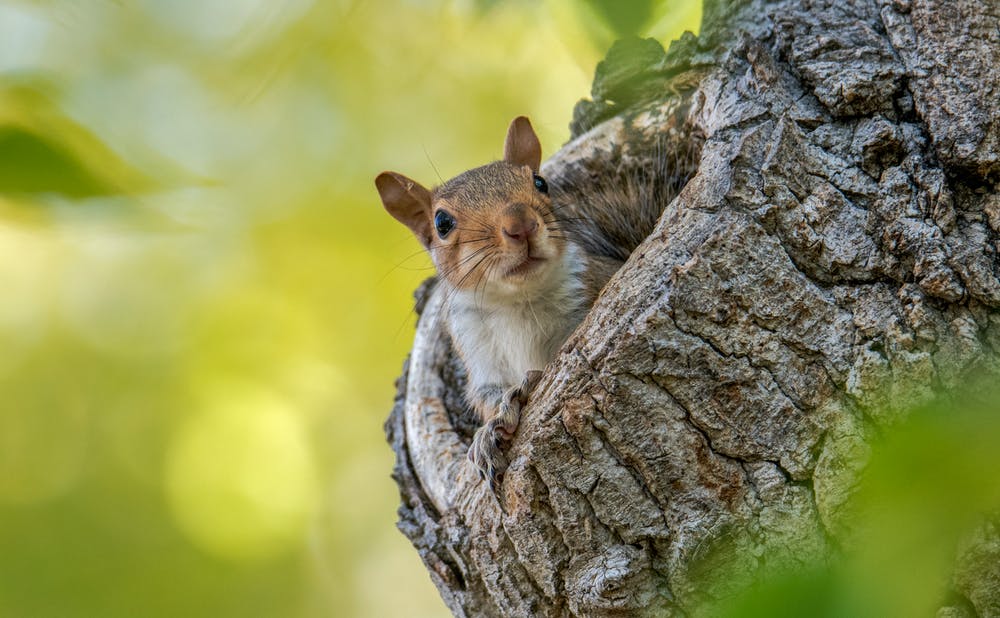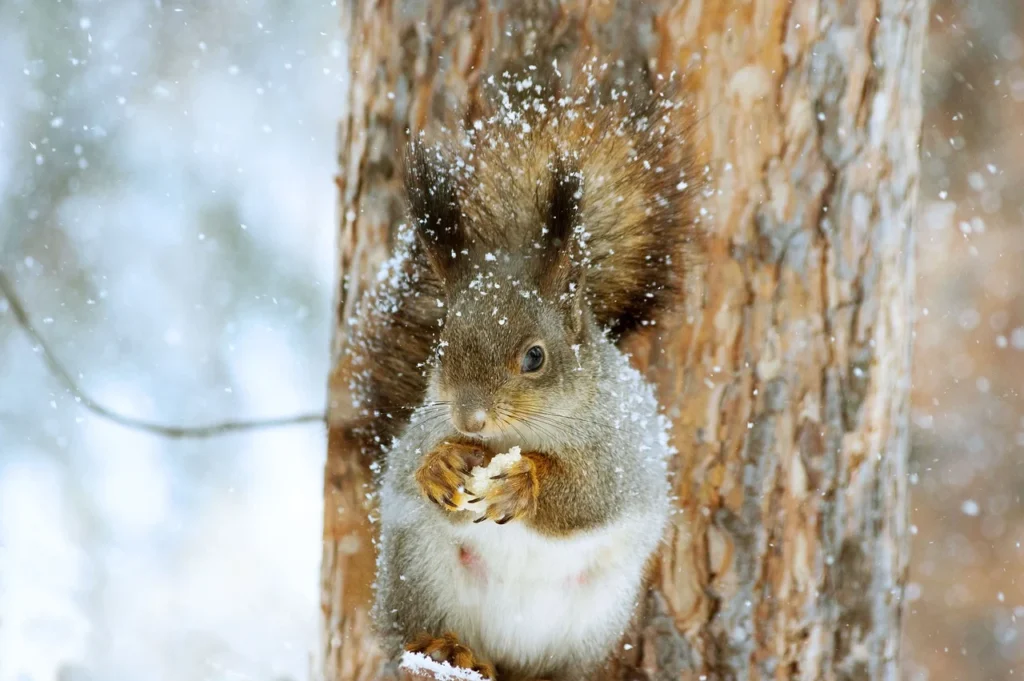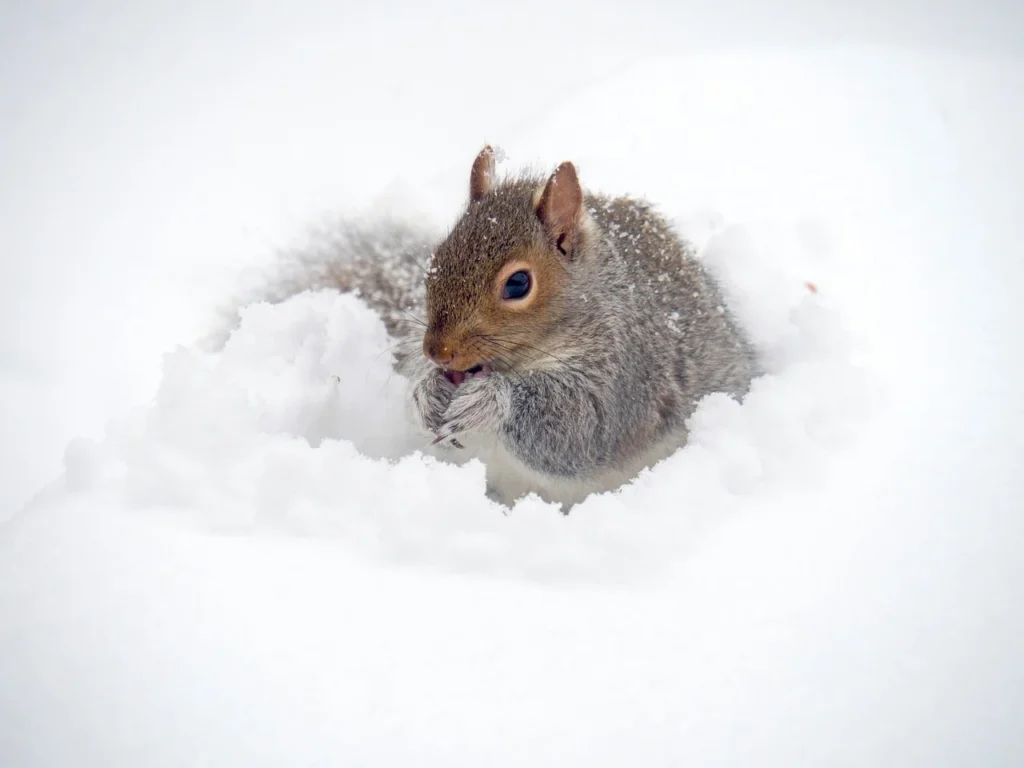Table of Contents
We’re all familiar with the sight of a grey squirrel storing food away in their nests, and this must mean that they hibernate, right? Well, no. Not quite.
Despite common assumptions, squirrels do not hibernate. At least not in the traditional sense. Squirrels become less active during the winter months, but what are the furry creatures up to if they’re not hibernating?
This article discusses what is meant by the term ‘hibernation’, why some animals use it as a survival tactic, and why squirrels don’t hibernate.

What is hibernation?
We all know that some animals hibernate during the winter months, but what does it actually mean?
Hibernation is much more than just sleeping for a few months. For many animals, it is their only option for surviving the coldest time of year. But, surprisingly, it isn’t only used to survive the cold!
Which animals hibernate?
Many creatures take advantage of the tactic to make it through the winter. It’s mainly small mammals like dormice, hamsters, hedgehogs, bats and chipmunks that hibernate – however, some insects, amphibians and reptiles also rely on this survival method.
How does hibernation work?
Hibernation is, in its simplest form, a method of conserving energy. When you sleep, you undergo physiological changes; for example, your breathing and heart rate slows. These changes are dialled up to the max during hibernation to significantly slow the animal’s metabolism and conserve energy.
Torpor refers to a state in which metabolism is decreased to less than 5% of normal. Animals can extend this state when hibernating for long periods – think of it as power saving mode!
Why do animals hibernate?
Several factors contribute to why an animal hibernates; however, it is primarily a combination of temperature, food and protection.
Most creatures that hibernate are endothermic, meaning they regulate their own body temperature by generating internal heat. Take us, humans, as an example; when we are cold, our bodies begin to shiver. Using energy to generate movement in order to create heat and keep our core body temperature at the optimal figure. When animals lower their metabolism, their body temperature is set lower, requiring less energy to maintain.
This is important during winter when many of the food sources for these small animals are either no longer available or in short supply. Without a consistent source of food, they would have no chance of maintaining their average body temperature.
Lying dormant in a safe space is also crucial for protection during the dark winter months. If you’re not moving, you’re not making any noise, and you’re not drawing the attention of any predators around you.
Do squirrels hibernate?
No. Well… some do, just not the squirrels that we have here in the UK.
Squirrels are a common sight during summer and early autumn; however, as the temperature drops, so does the number of squirrel spottings. This fact alone is why many assume that squirrels hibernate in winter like so many other creatures. However, this is not true. Squirrels in the UK do not hibernate during winter.
They do tend to spend more time sleeping to conserve their energy.
To do so, they need a warm space to stay. Squirrels are known to enter properties during colder months, particularly loft spaces, so keep an eye out for any potential access points on the exterior of your property.
Which squirrels do hibernate?
We have two types of squirrels here in the UK; the most commonly seen grey squirrel and the seldom-spotted red squirrel. Although they are from the same family of rodents, squirrels are rather diverse creatures.

For example, our grey and red squirrels here in the UK are tree squirrels that do not hibernate. However, there are’ ground squirrels’ who do hibernate. Like the ‘yellow-bellied marmots’ over in the Rocky Mountains who bury themselves away from October until May!
Why don’t squirrels hibernate?
Squirrels don’t hibernate as they don’t really need to. Whilst hibernation may sound to us like a nice break and a chance to catch up on some sleep, it can be an exhausting and dangerous process. Lowering your body temperature is not an easy feat at all, and unfortunately, some animals don’t survive their hibernation periods. Additionally, an enormous amount of energy is required to end the hibernation process, and again, some unlucky animals cannot withstand the strain it puts on their bodies.
To avoid these risks and hibernation as a whole, squirrels take preparation for the winter months very seriously. Think of the stereotypical crazy doomsday preppers, but with added fur…
Animals, including squirrels, rely on their photo-neuroendocrine system to track the changes in seasons. When autumn arrives and the days start drawing in, squirrels know to prepare for the approaching drop in temperature and lack of food availability.
What do squirrels do in winter?
We’ve established that our grey and red furry friends don’t hibernate during the winter, but we never really see them during this season, so what are they up to?
Where do they live?
Squirrels live in nests, also referred to as “dreys”. You are likely to see squirrels living in nests in the trees in the summer, often close to a food source. In the winter, they tend to find a cavity in a tree or even a building and create their den, which offers extra shelter and protection from the harsh weather conditions.
They will pad out these spaces with various materials, including leaves, sticks, moss – anything they can get their little hands on! Squirrels are also notorious for ripping up loft insulation and carpets for extra padding in their nests! So keep an eye on your loft space during the winter months for signs of squirrels, as it’s much more common than you’d think.
What do squirrels eat?
Much like hibernating creatures, squirrels will use the autumn months to fatten up and store extra energy away for the colder period. Their diets are somewhat diverse, as squirrels will eat whatever they can get their hands on. This includes nuts, fruit, plants, seeds and even vegetables.
Grey squirrels use a tactic called ‘scatter hoarding.’ This process involves scattering their food collection all around their nest and then expanding into the rest of their territory, including your back garden! By doing this, they can store a large amount of food without taking up their whole nest. It also means that if a predator or a competing rodent discovers one stash of food, they haven’t got the squirrel’s entire supply.
Red squirrels, on the other hand, are plain old hoarders when it comes to food. They don’t rely on the scatter method like their grey counterpart and instead store all their food in one location – usually the tree where they have built their nest.
How do they survive the cold?
Squirrels employ several methods when the temperatures drop to stay alive and make it to spring.
The most obvious method is the bulking up of fat reserves. During the autumn, squirrels will up their food intake massively to gain fat that will help keep them warm. The rise in body fat differs across the different types of squirrel, but the increase can be as high as 50%.

Squirrels are known to be solitary creatures. So unless they have very young children, you’re almost guaranteed to always see a squirrel on its own. However, this may change in the winter. If the weather conditions are bad enough, squirrels will sometimes buddy up and share their dens for extra body heat to keep them warm. Unfortunately, this can often cause more problems than it solves, as squirrels are territorial animals and have been known to fight for the prime nesting spot.
Just like us, squirrels rely on the auto-response of shivering to maintain their core body temperature. As well as this, squirrels develop a thicker coat during the colder periods that help to keep them toasty in harsh conditions.
Are squirrels causing you problems?
As previously mentioned, one of their favourite tactics for surviving winter is to use your property as a shelter. Integrum are squirrel infestation experts in London and can help you solve a squirrel infestation problem or simply answer your queries regarding squirrels on your property.
If you’ve noticed squirrels in your home or property, call our specialist team on 0204 566 5522. We provide squirrel removal services throughout the southeast of England, including Croydon, Surrey, and London.




